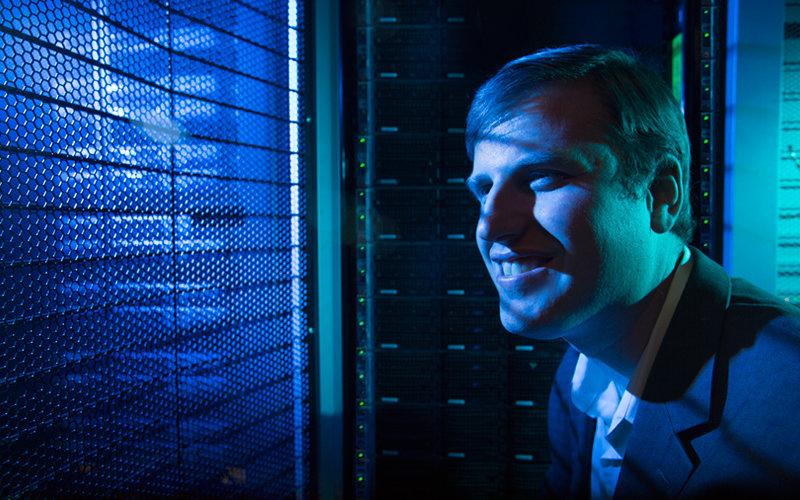
For his supercomputer simulations modeling cataclysmic events in the universe — such as colliding black holes that create gravitational waves — Cal State Fullerton physicist Geoffrey Lovelace has received the National Science Foundation’s prestigious CAREER award.
The award, granted through the National Science Foundation’s Faculty Early Career Development (CAREER) Program, is given to support faculty members early in their careers who have the potential to serve as academic role models in research and education and to lead advances in the mission of their department or organization.
A theorist specializing in numerical relativity, Lovelace is part of the CSUF faculty-student science team that contributed to the breakthrough discovery of gravitational waves, announced Feb. 11, 2016 — a century after Einstein predicted their existence in his general theory of relativity. Lovelace and his team of student researchers developed computer simulations and visualizations to better predict the sources of gravitational waves, such as colliding black holes or a black hole tearing apart a neutron star. A second gravitational-wave detection was announced in June.
Lovelace, an assistant professor of physics who began teaching at CSUF in 2012, is expected to receive a total of $400,000 for his five-year project, “CAREER: Computational Gravitational-Wave Science and Education in the Era of First Observations.” He and his student researchers in CSUF’s Gravitational-Wave Physics and Astronomy Center (GWPAC) will use supercomputer calculations to help Advanced LIGO researchers observe as many gravitational waves as possible, while learning more about the sources of gravitational waves. Research collaborators include GWPAC colleagues, LIGO Scientific Collaboration and the Simulating eXtreme Spacetimes (SXS) Collaboration.
“What we learn from these calculations will help gravitational-wave astronomers to extract the most exciting and surprising results hidden in the waves, like how big the black holes that merged were, how fast were they spinning, and whether Einstein’s theory of gravity holds up under the most extreme conditions in the universe,” he said.
Their work focuses on calculating how colliding black holes warp space and time, and what the resulting gravitational waves “sound like” to help LIGO know what faint signals to “listen” for. This award also allows the researchers to use supercomputer calculations to better understand the most important sources of noise that keep LIGO from detecting fainter gravitational waves from farther away, Lovelace explained.
“Thanks to this award, we’ll be able to focus on the colliding black holes that are the most poorly understood, like those that are spinning very rapidly, and when LIGO observes gravitational waves from colliding black holes, we’ll be able to quickly respond, comparing LIGO’s data with our calculations,” he added.
The award also supports the expansion of CSUF’s supercomputer, known as the Orange County Relativity Cluster for Astronomy (ORCA), which Lovelace and colleagues built with grant funding from a National Science Foundation Major Research Instrumentation award, an award from the Research Corporation for Science Advancement and startup funding from CSUF. Additionally, Lovelace will lead a weeklong workshop each summer for students from CSUF, Citrus College and Santiago Canyon College to participate in hands-on activities, introducing them to supercomputers and the emerging field of gravitational-wave astronomy.
“I’m deeply grateful for this award. It will help us figure out more about how the universe works, while helping to train the next generation of scientists and engineers,” said Lovelace, who earned his doctorate in physics from Caltech. “At the same time, we’re showing students that scientific knowledge is discovered through measurements and creative, open inquiry. That knowledge and experience makes our graduates not only better scientists and engineers, but better citizens.”
CSUF Recipients of the CAREER Award
Lovelace is the fourth CSUF faculty recipient of the award. Joshua Smith, associate professor of physics and Dan Black Director of Gravitational-Wave Physics and Astronomy, received the award in 2013; Kiran George, professor of computer engineering, received it in 2012, and Barbara L. Gonzalez, professor of chemistry and biochemistry, in 2002.